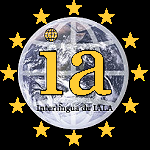Interlingua
| Interlingua | |
|---|---|
 | |
| Creautit bi | Alexander Gode an ithers |
| Date | 1951 |
| Settin an uissage | Internaitional auxiliary leid |
| Users | 1,500 (2000)[1] |
| Purpose | constructit leid
|
| Soorces | Inglis, French, Italian, Portuguese, and Spainish |
| Offeecial status | |
| Regulatit bi | nane |
| Leid codes | |
| ISO 639-1 | ia |
| ISO 639-2 | ina |
| ISO 639-3 | ina |
| Glottolog | inte1239[2] |
| Linguasphere | 51-AAB-ab |
Interlingua is an airtifeecial leid at uises wirds at can be foond in the majority o the leids o the Wastren Europe. It haes been inventit bi the IALA - a group o fowk (the maist weel-kent sowel bein Alexander Gode) at wirkit on its project ower 20 year. Thay feenisht and publisht the first dictionar in 1951. Interlingua wis creatit on the base o the vocabular o the follaein leids: Inglis, the Frainch, the Spanish, the Portuguese, an Italian.
The name o the leid is made up fae twa pairts: inter means "amang" or "atween"; lingua means "leid" or "langage". The developers wale’t the name "Interlingua" acause thay ettelt efter the leid bein applee’d tae ease the communication amang fowk fae sindry kintras. Acause Interlingua wis creatit airtifeecially tae be an easy leid, it is easier tae learn nor naitural leids.
Naurlins thoosands o fowk can uise Interlingua, an speakers o Interlingua claim at millions o fowk unnerstaund it (can read texts and listen tae awbody wha talks in Interlingua) wi nae need tae learn it aforehaund.
Thare twa ither airtifeecial leids in the warld wi mae nor a thoosand speakers - Esperanto and Ido. The baith gat creatit ere Interlingua. Some fowk think at Esperanto and Ido be easier tae lear acause thir leids daesnae hae "exceptions" (wirds at gae conter the rowles), but ithers think at Interlingua be mair easy acause the developers wale’t aw the wirds for tae be easy tae unnerstaund for onybody at kens Inglis, the Frainch, Spanish, Portuguese, or Italian, an aw as leids like Occitan an Romanian, ilk (cep Inglis) leids at come fae the Laitin, the leid uised in Rome a lang time syne.
Mair oot ower, the speakers o Interlingua claim at thair leid represents a new Laitin, juist simpler an mair "modrenised."
Ensaumple text in Interlingua[eedit | eedit soorce]
- Lingua natural e musical de parolas international e un grammatica minimal. Comprensibile facilemente per personas intelligente. Le medio de communication adequate pro le solution del confusion de Babylon.
- A naitural an muisical leid wi international vocables an a peerie grammar. Easily unnerstuid bi gleg fowk. The mean o communication uissfu eneuch for tae be the repone tae the confuision o Babylon.
Pater Noster in Interlingua[eedit | eedit soorce]
- Nostre Patre, qui es in le celos, que tu nomine sia sanctificate; que tu regno veni; que tu voluntate sia facite super le terra como etiam in le celo.
- Da nos hodie nostre pan quotidian, e pardona a nos nostre debitas como nos pardona a nostre debitores, e non duce nos in tentation, sed libera nos del mal.
- Wir faither, wha is in heiven, hallaed be thy name; thy kinrick come; thy weel be duin on Yird like in heiven.
- Gie’s the day wir daily bit breid, an forgie’s wir dets like we forgie wir dettors, an daenae lead us intae provoktion, but deleever us fae ill.
Interlingua in Wikipedia[eedit | eedit soorce]
Interlingua haes its awn Wikipedia an aw.
References[eedit | eedit soorce]
- ↑ Fiedler, Sabine (1999). "Phraseology in planned languages". Language Problems and Language Planning. John Benjamins Publishing Company. 23 (2): 175–187. doi:10.1075/lplp.23.2.05fie. ISSN 0272-2690. OCLC 67125214.
- ↑ Nordhoff, Sebastian; Hammarström, Harald; Forkel, Robert; Haspelmath, Martin, eds. (2013). "Interlingua". Glottolog. Leipzig: Max Planck Institute for Evolutionary Anthropology.
Ither wabsteids[eedit | eedit soorce]
| This leid-relatit airticle is a stub. Ye can help Wikipaedia bi expandin it. |
